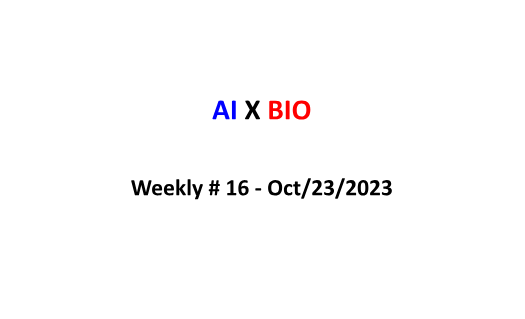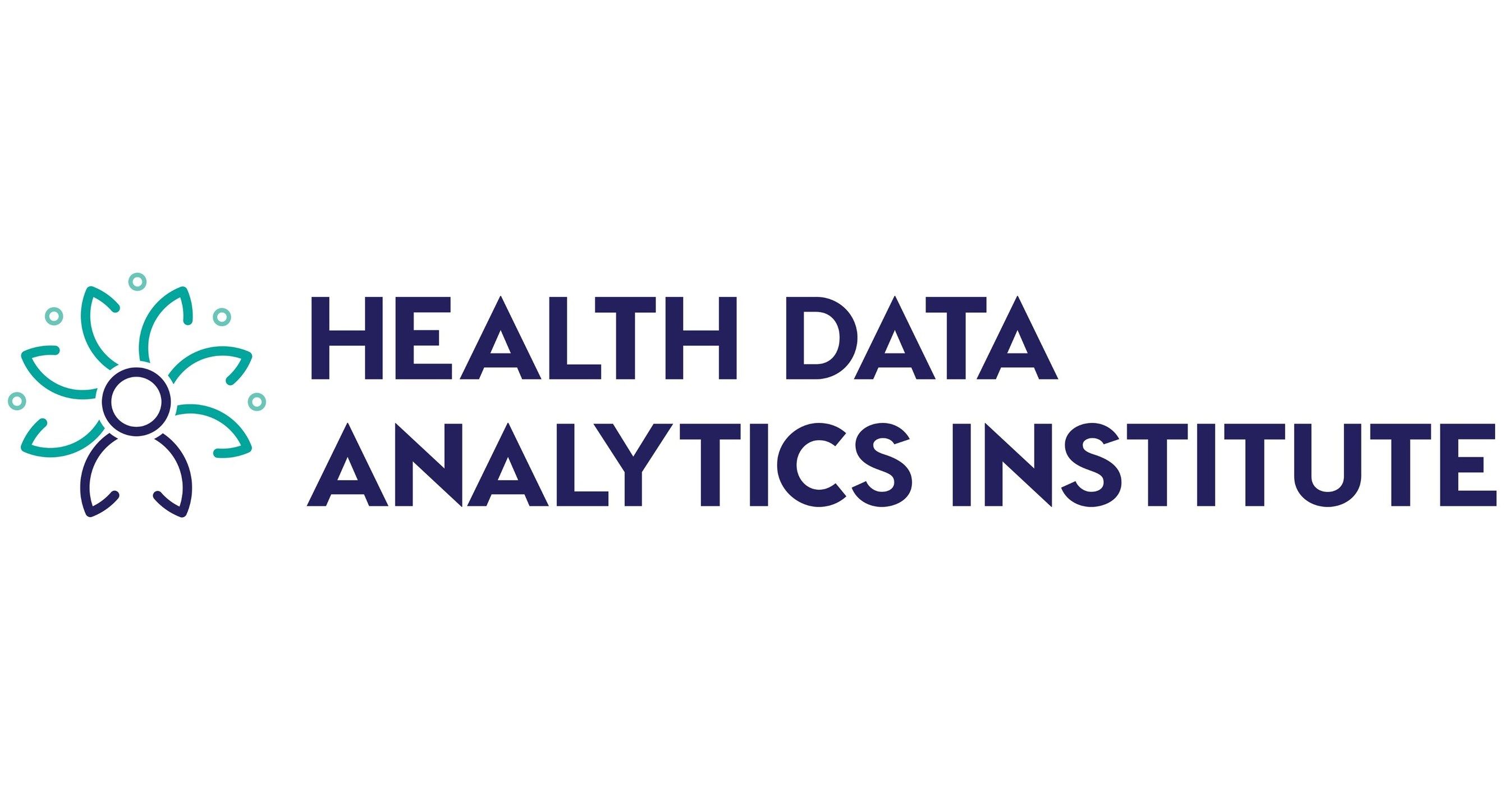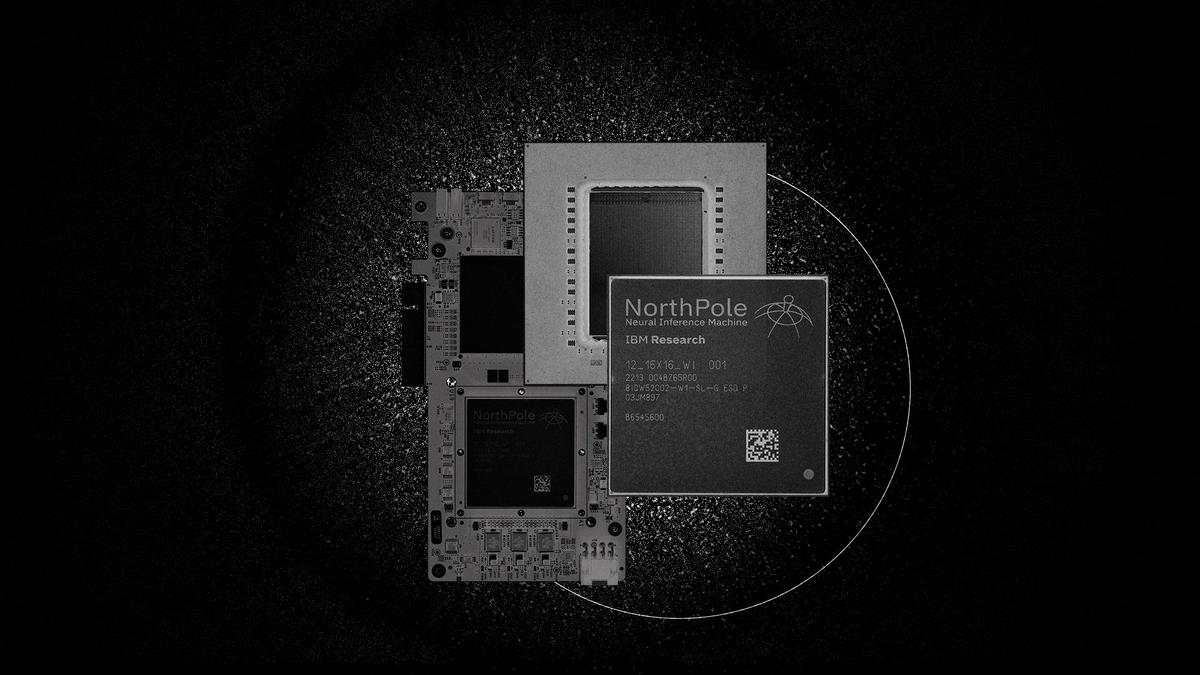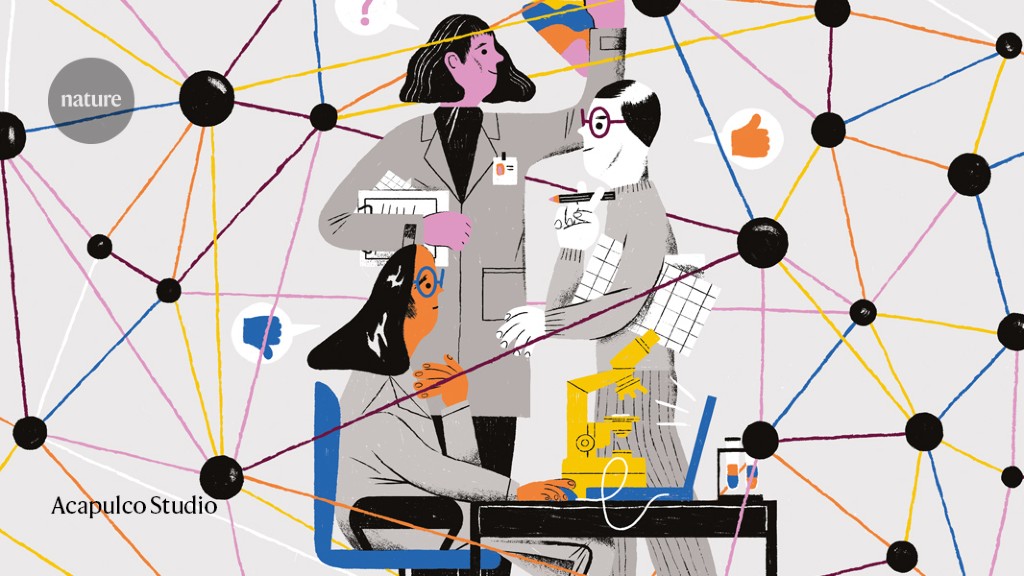- AIXBIO
- Posts
- AIXBIO Weekly #16 - Oct/23/2023
AIXBIO Weekly #16 - Oct/23/2023

Ethical AI
Stanford's Call for Transparency: Urging AI Giants to Reveal More
Stanford University researchers have recently published a report that delves into the transparency practices of major AI companies, notably OpenAI and Google. The primary focus of this report is to measure the transparency levels of artificial intelligence foundation models. The authors are advocating for these tech giants to be more open, particularly about the data they use and the human labor involved in training their AI models. This call for transparency is seen as a move towards more ethical and responsible AI practices. As AI continues to play a pivotal role in various sectors, understanding its foundation and the principles behind its creation becomes crucial. The report by Stanford emphasizes the need for companies to be more forthcoming, ensuring that AI models are not just efficient but also ethically developed.
📢 The ✨Foundation Model Transparency Index ✨ scores 10 companies on 💯 measures of transparency
1⃣ No company scores above 60%
2⃣ No company shares adequate information about the real world impact of its top model
3⃣ Transparency is necessary for evidence-backed policy
— Kevin Klyman (@kevin_klyman)
6:17 PM • Oct 18, 2023
Read the paper : The Foundation Model Transparency Index
Google's AI Vision: Pioneering Global Health Equity
Google's AI envisions equitable global health. With tools for mental & metabolic health, malignancy & maternity, partnerships like with iCAD aim for early cancer detection. AI principles ensure responsible tech use. Bias checks & diverse expert input are emphasized.
Google is making strides in AI technology to transform global health, aligning its innovations with the UN Sustainable Development Goals, particularly in areas like mental health, metabolic diseases, and maternal health.
Recognizing the importance of reliable information, especially in mental health, Google collaborates with entities like the World Health Organization to offer authoritative health content. The integration of machine learning with mobile sensors now allows individuals to track vital health metrics, facilitating better patient-doctor collaborations.
Google's alliances, including with iCAD for breast cancer detection and the OnTIME Consortium in Nigeria for maternal health, underscore its dedication to democratizing advanced health solutions. The introduction of Med-PaLM, Google's generative AI model, promises to enhance healthcare further. Adhering to its AI Principles, Google prioritizes responsible tech development, actively mitigates biases in AI models, and ensures diverse expert input.
Funding
GE HealthCare Secures $44M for AI-Driven Ultrasound Tech for Mass Casualty Preparedness
GE HealthCare inks $44M deal with BARDA for AI ultrasound tech to diagnose lung & trauma injuries. Aims to boost mass casualty readiness. Collaboration could reshape care delivery & emergency response
GE HealthCare has announced a significant collaboration with the Biomedical Advanced Research and Development Authority (BARDA), securing a $44 million contract. The partnership's primary objective is to harness AI in developing point-of-care ultrasound technology. This innovative technology is poised to empower clinicians, enabling them to diagnose and treat a spectrum of lung pathologies and traumatic injuries encompassing the head, chest, and abdomen. The initiative will leverage GE HealthCare's existing ultrasound technology, enhancing it with AI capabilities. The resultant advanced probe and ultrasound system is envisioned to be a game-changer, facilitating swift and accurate diagnoses of head trauma, multiple lung pathologies, and injuries, including the severe blast lung.
Evident Vascular Secures $35M Funding for Advanced AI-Driven Intravascular Imaging
Evident Vascular launches with $35M Series A funding, aiming to develop an AI-driven IVUS platform for enhanced vascular imaging. The platform seeks to revolutionize vascular interventions.
Evident Vascular, Inc., a medical technology startup, is on a mission to revolutionize the field of intravascular imaging. With a focus on developing a next-generation intravascular ultrasound (IVUS) platform, the company is leveraging the power of artificial intelligence to achieve superior imaging capabilities and more streamlined workflows. This ambitious project has garnered significant financial backing, with the company announcing a $35 million Series A financing round from Vensana Capital®.
Health Data Analytics Institute Secures $31M to Enhance AI-Powered Predictive Risk Platform
HDAI secures $31M funding to expand its AI-driven predictive risk platform. Collaborating with top health systems, the platform aims to optimize care & improve outcomes
Health Data Analytics Institute (HDAI) recently announced a significant $31 million funding round to further scale its predictive risk platform. This AI-focused company is dedicated to empowering clinicians, refining care pathways, and enhancing patient outcomes. The funding is expected to drive the expansion of their new AI platform, which is already in use by renowned health systems like Houston Methodist. HDAI's commitment to transforming vast health data volumes into actionable insights is evident in their collaboration with several preeminent health systems, including Cleveland Clinic and Dana-Farber Cancer Institute.
HDAI's collaborations extend to over 40 Medicare Accountable Care Organizations, generating a staggering 50 million weekly predictions for a million patients. Their technology platform is at the forefront, incorporating explainable ML and Generative AI to quantify risks and identify clinical improvement opportunities. The HealthVision™ product, part of their platform, offers a detailed analysis of healthcare outcomes and costs, providing physicians with a synthesized view of patients' medical histories. This allows for more personalized treatment plans and efficient information retrieval.
Microsoft
Microsoft is making significant strides in the healthcare sector, emphasizing the transformative power of data and AI. Recognizing that a vast majority of hospital data remains untapped, Microsoft aims to unlock these insights to improve health outcomes, patient experiences, and organizational efficiency. At the HLTH 2023 conference, Microsoft introduced a slew of new data and AI solutions. A notable launch is Microsoft Fabric, a unified analytics platform tailored for healthcare. This platform aims to consolidate data from various sources, such as EHRs and medical devices, providing a comprehensive view and facilitating AI-driven insights.
Additionally, Azure AI services have been enhanced with functionalities like patient timelines, which use generative AI to chronologically organize patient data, and clinical report simplification, which decodes medical jargon for better patient understanding. These innovations align with Microsoft's vision of high-impact, low-risk AI applications in healthcare. Collaborative ventures, especially with Epic, are also on the horizon. The integration of AI into EHR workflows, the ability to draft patient messages automatically, and the potential for clinical note summarization are some of the promising developments in this collaboration.
Innovation
Decoding Brain Activity: Meta's Breakthrough in Visual Representation Using AI
Meta's AI decodes visual brain activity using MEG, potentially aiding speech-loss patients. Research aligns with modern AI systems & may shape future AI development.
Every day, our brains process a myriad of sensory signals, translating them into meaningful representations of our surroundings. Meta's recent announcement marks a significant stride in understanding this intricate process. Utilizing magnetoencephalography (MEG), a technique that captures thousands of brain activity measurements every second, Meta has developed an AI system that decodes visual representations in the brain with unmatched temporal precision. This system can operate in real-time, reconstructing images that the brain perceives and processes. Such advancements not only provide insights into how our brains represent images but also lay the groundwork for potential clinical applications, especially for individuals who've lost their ability to communicate verbally. The system's architecture comprises three main components: an image encoder, a brain encoder, and an image decoder. The image encoder crafts a comprehensive representation of the image, independent of the brain. The brain encoder then aligns MEG signals to these image representations. Lastly, the image decoder produces a plausible image based on these brain representations. While the images generated through MEG are insightful, they aren't as precise as those produced using functional Magnetic Resonance Imaging (fMRI). Nevertheless, the research underscores the potential of MEG in decoding complex brain representations with millisecond accuracy. This endeavor is part of Meta's broader initiative to delve into the intricacies of human intelligence, drawing parallels and distinctions with current machine learning algorithms, and guiding the evolution of AI systems that emulate human reasoning.
Harvard and Oxford's AI Tool Foresees Virus Mutations
Harvard & Oxford unveil AI tool, EVEscape, predicting virus mutations. If used early in the COVID-19 pandemic, it'd have foreseen major SARS-CoV-2 mutations. Tool also eyes future variants & other viruses.
Researchers from Harvard Medical School and the University of Oxford have introduced an innovative AI tool, EVEscape. This tool is designed to predict potential mutations in viruses. It combines a model of evolutionary sequences, which forecasts possible changes in a virus, with in-depth biological and structural data about the virus. This combination allows EVEscape to anticipate the most probable variants as the virus evolves. A study revealed that if EVEscape had been in use at the onset of the COVID-19 pandemic, it would have accurately predicted the predominant mutations and pinpointed the most alarming SARS-CoV-2 variants.
Furthermore, the tool has shown its capability in making precise predictions about other viruses, such as HIV and influenza. The researchers are now utilizing EVEscape to anticipate future SARS-CoV-2 variants, releasing a ranking of new variants biweekly. This data could potentially aid in the creation of more effective vaccines and treatments. The overarching goal is to proactively anticipate variations in viruses, which would be pivotal for vaccine and therapeutic design.
What are the implications in “ Gain of Function” research ?
The development of EVEscape is crucial as it offers a proactive approach to understanding and anticipating virus mutations. By predicting potential variants, it can guide the medical community in developing more effective treatments and preventive measures, ultimately saving lives.
EUREKA: A Leap Forward in Language-Driven Robotics Rewards
EUREKA, a novel method translating text instructions to robotic rewards, reportedly outperforms human experts in 83% of tasks, marking a 52% improvement. This advancement in language-driven robotics hints at the future of AI & robotics and Medical devices
In robot learning, LLMs are good at generating high-level plans and mid-level actions like pick and place (VIMA, RT-1, etc.), but fall short of complex, high-frequency motor controls.
The Eureka! moment for us (pun intended) is that reward functions through coding is the key… twitter.com/i/web/status/1…
— Jim Fan (@DrJimFan)
4:02 PM • Oct 20, 2023
Language-Driven Reward Function Generation for Reinforcement Learning delves into the innovative realm of generating reward functions through language-driven techniques. The primary objective is to seamlessly bridge the divide between natural language instructions and the actions of robots. To achieve this, the researchers introduce EUREKA, an advanced method capable of translating textual directives into functional reward mechanisms. This significant leap underscores the potential and efficiency of EUREKA in the domain of reinforcement learning.
Furthermore, the inherent versatility of EUREKA paves the way for a groundbreaking gradient-free in-context learning approach, specifically tailored for reinforcement learning derived from human feedback (RLHF).
Read the paper : Eureka: Human-Level Reward Design via Coding Large Language Models
Application
Insilico Medicine Unveils Novel AI-Driven Cancer Treatment Candidate
Insilico Medicine , a generative artificial intelligence (AI)-driven clinical-stage drug discovery company, announced the nomination of ISM9274, a highly selective covalent dual-inhibitor of CDK12/13 as a preclinical candidate (PCC) for cancer treatment.
Insilico Medicine, a global clinical-stage biotech company leveraging generative AI, has announced the nomination of ISM9274 as a preclinical candidate for cancer treatment. This molecule is a highly selective covalent dual-inhibitor of CDK12/13. CDK12, a transcription-associated kinase, has been identified as a potential therapeutic target for various cancers, including triple-negative breast cancer and pancreatic cancer. Insilico's research, backed by AI-driven indication explorations from PandaOmics, played a pivotal role in this discovery. In vitro studies revealed that ISM9274 has potent antiproliferative activities across 60+ cancer cell lines.
Lung Cancer Screening with AI: A Leap Towards Personalized Healthcare
CCAIM & UCL's AI models aim to simplify lung cancer screening. Using age, smoking duration & daily cigarette consumption, they predict risk with high accuracy.
CCAIM researchers, in collaboration with UCL, have taken a significant step towards revolutionizing lung cancer screening. Their newly developed machine learning models are designed to simplify the screening process, potentially bringing personalized screening to the forefront of healthcare. The importance of this development is underscored by the potential reduction in lung cancer-specific mortality by 20-24%. The study, which utilized data from both the UK Biobank and the US National Lung Screening Trial, explored over 250 machine learning pipelines. The final model, impressively, relies on just three variables: age, smoking duration, and daily cigarette consumption. This model not only achieves accuracy on par with or better than existing models but does so using only a fraction of the variables, making data collection more streamlined. The research has garnered support from renowned institutions, including the National Science Foundation. The overarching aim is to simplify population-level screening for lung cancer, making it more accessible and cost-effective. The potential implications of this research are vast, with the possibility of extending this approach to other diseases in the future.
Lumen: The AI Voice Coach Revolutionizing Mental Health Therapy
Researchers utilized AI voice coach, Lumen, for therapy, showing improved depression & anxiety symptoms in patients & brain activity changes. Virtual therapy may aid mental health care access.
Researchers from the University of Illinois Chicago conducted a pioneering pilot study using an AI voice-based virtual coach named Lumen for behavioral therapy. The study revealed promising outcomes, with patients showing improved symptoms of depression and anxiety, coupled with notable changes in brain activity. This innovative approach to therapy brings hope to address the challenges in mental health care access, especially in the aftermath of the COVID pandemic.
Lumen, which functions as a skill within the Amazon Alexa application, was developed with the support of a $2 million grant from the National Institute of Mental Health. The study observed significant changes in the dorsolateral prefrontal cortex of patients, a region associated with cognitive control. While the technology isn't intended to replace human therapists, it can serve as a bridge to address the increasing demand for mental health care, especially in vulnerable communities.
AI-Powered Eye Scans: A Minute to Predict Heart Disease Risk
AI tool scans eyes & predicts heart disease risk in less than 1 min. Enables non-invasive cardiovascular screening on the high street. Claims to be Comparable to Framingham risk scores. Potential game-changer in early detection.
Researchers have developed an AI tool that can predict a person's risk of heart disease in less than a minute by scanning the eyes. This groundbreaking discovery could revolutionize cardiovascular screening, allowing health workers to conduct tests using a camera, eliminating the need for blood tests or blood pressure checks. The study, the largest of its kind, utilized AI-enabled imaging of the retina's veins and arteries to determine the risk of cardiovascular disease, cardiovascular death, and stroke. The results suggest a highly effective, non-invasive test for those at medium to high risk of heart disease. The AI tool, named Quartz, was used on 88,052 UK Biobank participants aged 40 to 69. The tool's performance was comparable to the widely recognized Framingham risk scores framework. Circulatory diseases, including cardiovascular disease, are major causes of ill health and death globally. The AI tool uses data like smoking history, high blood pressure medication, and previous heart attacks. The retina data computed by Quartz was significantly associated with cardiovascular disease, deaths, and strokes.
Bio Inspired Tech
IBM's NorthPole chip
inspired by brain functions, offers enhanced AI efficiency. With on-chip memory, it's faster & more energy-efficient than peers. Ideal for real-time AI tasks like autonomous driving & robotics. Potential game-changer in AI tech.
IBM Research has unveiled a groundbreaking chip prototype, NorthPole, which promises to redefine the efficiency of AI applications. This innovation emerges amidst a rapid evolution in AI, where the existing hardware, though powerful, wasn't tailored for contemporary AI demands. As AI systems expand, the associated costs surge. IBM's NorthPole, a product of nearly two decades of research, could be the solution to this challenge. Traditional computer chips have separate storage for processing units and memory, leading to the von Neumann bottleneck. This causes delays as data shuttles between memory and processing units. NorthPole, inspired by the brain's computing mechanism, seeks to eliminate this bottleneck. Tests have shown that NorthPole outperforms other chips in energy efficiency, space efficiency, and latency. One of its standout features is the on-chip memory, which accelerates AI inferencing. Potential applications for NorthPole are vast, from computer vision tasks like detection and image segmentation to natural language processing and speech recognition. It could also play a pivotal role in real-world applications like autonomous vehicles, robotics, and digital assistants. While the chip has shown immense promise, it's still in the research phase, with further exploration needed to maximize its potential.
Opinions
Researchers Weigh In: The Promises & Concerns of AI in Science
Over 1,600 researchers in a Nature survey highlight the growing role of AI in science. While many see its potential, concerns about misuse & bias persist. AI's transformative impact on research is undeniable, but caution is urged.
A recent survey by Nature, involving more than 1,600 global researchers, reveals the expanding role of artificial intelligence (AI) in scientific research. The majority of respondents anticipate AI tools to become 'very important' or 'essential' within the next decade. The survey indicates a rise in the mention of AI terms across all research papers over the past ten years.
Machine-learning techniques are well-established, and there's a surge in the use of generative AI, especially large language models (LLMs). These models assist in summarizing research papers, brainstorming, writing code, and even in areas like protein structure prediction and medical diagnoses. However, alongside the excitement, there's a palpable concern. About 69% of researchers believe AI can lead to over-reliance on pattern recognition without genuine understanding. There are worries about biases, potential fraud, and irreproducibility.
Another significant concern is the commercial dominance in AI resources and tools. Some researchers feel that collaboration with these commercial entities is crucial. Despite the potential pitfalls, many researchers believe in the transformative power of AI. The key is to harness its benefits while being aware of its limitations.
AI & ML: Pioneering the Future of Healthcare and Drug Discovery
AI & ML are transforming healthcare: from enhanced medical imaging to predictive analytics for disease risks. Generative AI tools like ChatGPT show potential in health data. AI also aids in drug repurposing
Artificial intelligence (AI) and machine learning (ML) are at the forefront of healthcare innovation. These technologies are enhancing medical imaging, with AI being able to detect anomalies that might be overlooked by the human eye. Additionally, natural language processing is streamlining the input of electronic health records, reducing the workload on healthcare professionals.
Predictive analytics, powered by AI, are identifying individuals at risk of chronic diseases, enabling early interventions and pinpointing the most effective treatment options. The healthcare sector is also witnessing the introduction of AI-generated drug candidates into clinical trials. Generative AI tools, exemplified by OpenAI’s ChatGPT, are being integrated into health data solutions, facilitating natural language searches across diverse datasets. This not only saves time but also provides clearer, concise answers. Moreover, AI and ML are being employed to repurpose or retarget existing drugs.
Trends
HLTH 2023 highlights: AI's potential in healthcare discussed, with emphasis on data use, patient experience & women's health. Concerns about AI's validation & bias raised.










